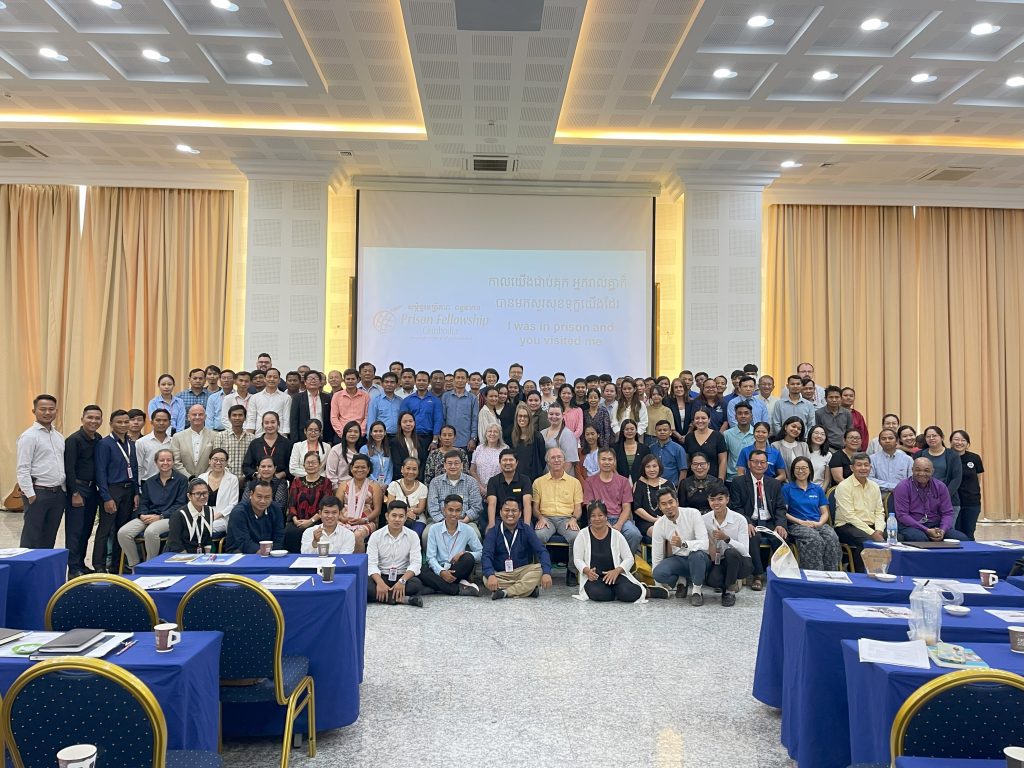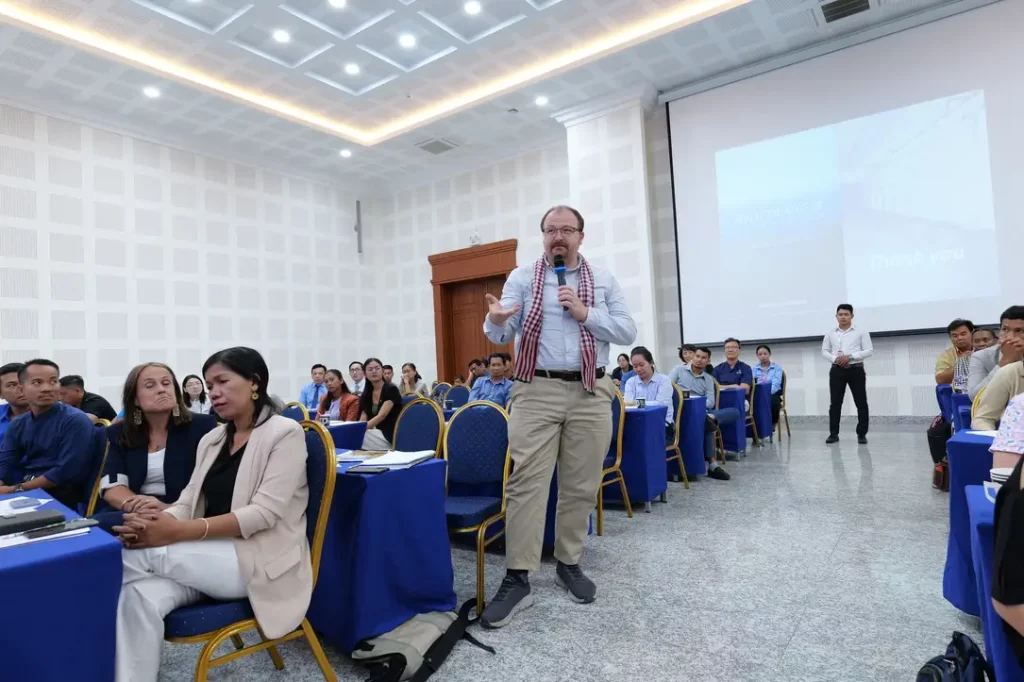We’re aware of three organizations working in prisons in Cambodia. Two of the three – Peace Bridges and Khmer Vulnerability Aid Organization – are already current MCC partners, Prison Fellowship Cambodia is the other. I’ve been wanting to connect with Prison Fellowship to see if we could work towards a partnership with them too but it wasn’t possible during COVID-19 restrictions. So I was glad when they shared a public invitation to their annual conference on Facebook.
The theme of the Prison Fellowship Cambodia annual conference was “I was in Prison and You Visited me.” There were a little over 100 attendants, the majority (about 90%) being Khmer. The day started with a brief worship service that included singing “In Jesus, We Are One Family” and a time of group prayer.

Several former inmates presented about their experience with Prison Fellowship Cambodia and being in prison turned their life around. The first shared that he had committed murder and was filled with negative emotions in prison before being visited by Prison Fellow Cambodia. He talked about the power of the 12 Step Program Celebrate Recovery in his life. He is now a teacher with Prison Fellowship Cambodia who goes into prisons in Preah Vihear province. The second former inmate was a Christian before being arrested and said only that “something happened” that let to him being arrested. He shared that he was judicial and at the lowest point of his life when he was visited in prison. This turned his life around and deepened his faith, as he became a group leader in prison over the remainder of his seven year sentence. Now he works at a factory and volunteers as a teacher who still goes into prison.
Volunteers shared about their experience going into prisons. This included a Khmer Pastor and an American volunteer. The American shared a story about accidentally messing up her first lesson in prison and starting with the Holy Spirit chapter from mid-way through the lesson plan instead of the first chapter. She prayed that this was what someone needed. She said that the female prisoners stared at her blankly, answering “yes, yes” mildly when she asked them questions. In the lesson, she told them that the Holy Spirit was always with you, protecting you, and warding away other spirits. At the next lesson one of the prisoners, who had been blank before, approached her with excitement and proclaimed that, “Teacher, I was thinking so much so I prayed to your Holy Spirit. Since then I’ve had the best sleep in my whole life!” This caught the attention of the other students who engaged more from then on. The volunteer highlighted that we mess up, stumble, get things wrong – but just going and doing is the most important thing. God can work through us, but we have to go.
When he came to the village of Nazareth, his boyhood home, he went as usual to the synagogue on the Sabbath and stood up to read the Scriptures. The scroll of Isaiah the prophet was handed to him. He unrolled the scroll and found the place where this was written:
“The Spirit of the Lord is upon me,
for he has anointed me to bring Good News to the poor.
He has sent me to proclaim that captives will be released,
that the blind will see,
that the oppressed will be set free,
and that the time of the Lord’s favor has come.”He rolled up the scroll, handed it back to the attendant, and sat down. All eyes in the synagogue looked at him intently. Then he began to speak to them. “The Scripture you’ve just heard has been fulfilled this very day!”
Luke 4: 16-21, NLT (Emphasis mine)
After a Coffee break, the keynote speaker was Rev. Professor Tobias Brandner, a Swiss Theologian who has lived in Hong Kong for over twenty years. Brandner has written a 2014 book on Prison Ministry titled Beyond the Walls of Separation. Christian Faith and Ministry in Prison. We connected over his friendship with MCC Alumni Max Ediger, who attended church with him in Hong Kong. Brandner started with the abundant scriptural foundation for Prison Minister noting that Jesus’ first words of ministry in Luke is quoting the scripture that includes, “He has sent me to proclaim freedom for the prisoners.” He then noted that, biblically, captivity isn’t exclusively a negative but it is also a time to reach out – to minister – to connect. He talked about some of the many figures in the Bible who were imprisoned – Joseph, Jeremiah, Daniel, John the Baptist, Paul, Silas, Peter, Jesus – and noted that the Israelite periods of captivity in Egypt and Babylon were also comparable to prison. He then noted that many people go into Prison Ministry with the attitude “I’m bringing x to the prisoners” where x is Jesus, healing, hope, etc. He noted that Jesus said, “I was in Prison and you visited me.”
No, we are not bringing Jesus to prison. Jesus is already there. We’re visiting him.
Rev. Professor Tobias Brandner
Brandner said that this meant that “No, we are not bringing Jesus to prison. Jesus is already there. We’re visiting him.” He also said that, “Freedom isn’t just being able to move around as we want, freedom also has a spiritual dimension.” While we outside captivity, we can pretend that all is good in our life but inside captivity we can no longer pretend.
Life in a prison cell may well be compared to Advent; one waits, hopes, and does this, that, or the other – things that are really of no consequence – the door is shut, and can be opened only from the outside.
Dietrich Bonhoeffer, 1943 letter
He also shared some words from a man named Warren, who is serving a life sentence in the Philippines. “Visitors may discover a different kind of freedom, namely the spiritual freedom that is not affected by walls. Some say it like seeing real people. They are more real because they have seen the other side, they have faced their demons; they are not afraid to talk about their past, while some people outside are still in denial that they are sinners.” He then went on to talk about Dietrich Bonhoeffer, the conscientious objector who was imprisoned and executed by the Nazis, who wrote, “Life in a prison cell may well be compared to Advent; one waits, hopes, and does this, that, or the other – things that are really of no consequence – the door is shut, and can be opened only from the outside.” He also shared the quote from Fyodor Dostoevsky that, “A society should be judged not be how it treats its outstanding citizens but by how it treats its criminals.”
A society should be judged not be how it treats its outstanding citizens but by how it treats its criminals.
Fyodor Dostoevsky
Brandner then continued to highlight that Prison Minister is not a one-way program, where the visitor provides everything and the prisoner simply receives. Instead, he argued that in order to be effective we have to be open to mutual transformation. He noted that, in his experience, most prisoners crave fellowship not long sermons. It is a ministry of presence. “You don’t need to preach the gospel because you are the gospel. The fact that you are there is Good News.”
You don’t need to preach the gospel because you are the gospel. The fact that you are there is Good News.
Rev. Professor Tobias Brandner
He shared a model he has developed of the five key qualities needed for successful prison ministry – Genuineness, Unconditional Positive Regard, Empathy, Compassion, and Humility. He then said that he shared this model with a prisoner who told him that Genuineness and Humility were the ones that really mattered. Brandner stressed that we should go as listeners, not talkers. He quoted St. Francis, “Proclaim the Gospel! If necessary, use words.”
Proclaim the Gospel! If necessary, use words.
St. Francis of Assisi
He highlighted the differences between Working For, Being For, Working With, and Being With as they relate to a Ministry of Presence.

During the question time that followed I asked him about his experience with multiculturalism in prisons. What are the differences between a visit from someone in your culture and a visit from someone outside your culture? How does the relationship shift if the visitor to a Cambodian prisoner is a Cambodian or an American, for instance? He said that more could be said but that, in brief, there are pros and cons. Of course, someone from the same culture can connect more quickly and effectively due to shared cultural and lingual fluency – but that also means that shame is more likely to enter the relationship. While someone from a different culture will have trouble connecting but may be a safer person due to the distance between the cultures. A combination of both is very good because each brings different strengths and approaches to ministry. They should compliment each other.
I made some good connections with Prison Fellowship Cambodia staff and board members, as well as Cambodian Church leaders, Missionaries, and Attendants from Peer Organizations. Hopefully this will lead to some kind of collaboration in the future. It’s definitely one of the many things that we’ll be working on in the coming months.
Wow, thanks for this Charles. Light shines in the darkness…so appropriate during the Holy Week.